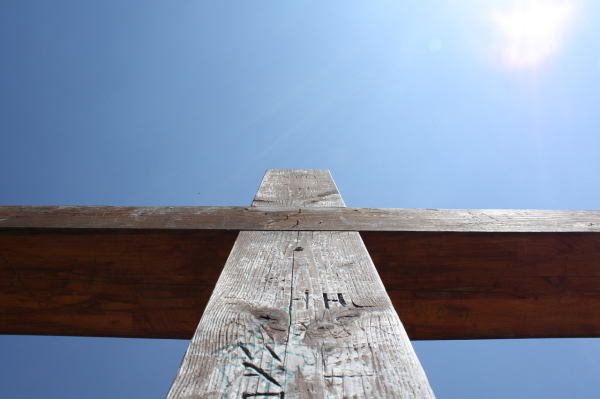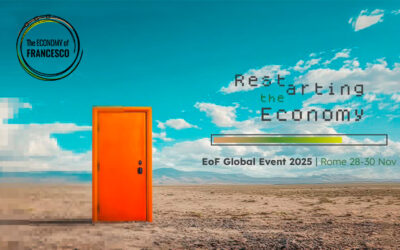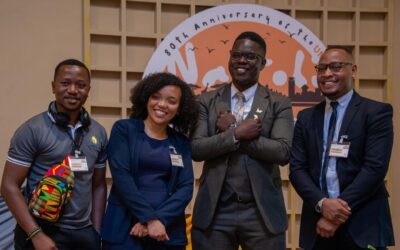 “That all may be one,” Those are amazing words! I believe it is impossible to think of words more beautiful and sublime than these. They make you dream of a world different from the one around us. It stirs your imagination to wonder what society would be like if this great ideal were fulfilled. Imagine a world where people love one another and where everyone shares the same feelings, where prisons have disappeared and the police are no longer needed. Imagine newspapers that do not report bad news – which is now out of fashion – but ‘golden news’ about divinely beautiful and deeply human events. It is a world where people sing, Yes, where they play, study, and work, but everything is done in harmony, where everyone does what they do to please God and their neighbours. I think we shall only see this world in Paradise. Yet Jesus spoke those words for us here, on earth. … I opened the Gospel and found another phrase that seemed uncannily like this one, as though a secret bond exists between it and our motto. It says, “When I am lifted up from the earth, I will draw all people to myself.” (Jn 12:32). “When I am lifted up from the earth…”. So Jesus did not make us “all one” through his wonderful words or his extraordinary miracles. The Cross was his secret. It was His suffering that solved the problem of making us all children of God and one amongst us. Could suffering, then, be the way, the key, and the secret to bringing unity among all people? Could it be the way to transform a boring and often wicked world into one that is joyful, shining with love and a foretaste of heaven? Yes, it is. As far as we know, the saints, who were genuinely intelligent, placed great value on suffering and the cross. They attracted huge numbers of followers and often left their mark on history — continuing to do good in future centuries. When I was a small child, a priest told me, “There is an empty place on the cross.” Turning over the crucifix that was on his table, he showed me the back and added, “This place is for you!” Okay then! If this is how it is, we are ready! What are we waiting for? In any case, large or small sufferings, accepted well or badly, will always be part of our life. We do not want to be opportunists! We are Christians! Is Jesus on the cross? I want to be there too. I will accept all the little crosses in my life joyfully. Yes, joyfully, even if I shed some tears. Nevertheless, deep down in my heart, I will tell Him who is listening to me: “I am happy. By suffering with You, I can help you draw all people to Yourself. In this way, we shall draw closer to the day when your great desire, ‘That all may be one,’ shall be fulfilled.”
“That all may be one,” Those are amazing words! I believe it is impossible to think of words more beautiful and sublime than these. They make you dream of a world different from the one around us. It stirs your imagination to wonder what society would be like if this great ideal were fulfilled. Imagine a world where people love one another and where everyone shares the same feelings, where prisons have disappeared and the police are no longer needed. Imagine newspapers that do not report bad news – which is now out of fashion – but ‘golden news’ about divinely beautiful and deeply human events. It is a world where people sing, Yes, where they play, study, and work, but everything is done in harmony, where everyone does what they do to please God and their neighbours. I think we shall only see this world in Paradise. Yet Jesus spoke those words for us here, on earth. … I opened the Gospel and found another phrase that seemed uncannily like this one, as though a secret bond exists between it and our motto. It says, “When I am lifted up from the earth, I will draw all people to myself.” (Jn 12:32). “When I am lifted up from the earth…”. So Jesus did not make us “all one” through his wonderful words or his extraordinary miracles. The Cross was his secret. It was His suffering that solved the problem of making us all children of God and one amongst us. Could suffering, then, be the way, the key, and the secret to bringing unity among all people? Could it be the way to transform a boring and often wicked world into one that is joyful, shining with love and a foretaste of heaven? Yes, it is. As far as we know, the saints, who were genuinely intelligent, placed great value on suffering and the cross. They attracted huge numbers of followers and often left their mark on history — continuing to do good in future centuries. When I was a small child, a priest told me, “There is an empty place on the cross.” Turning over the crucifix that was on his table, he showed me the back and added, “This place is for you!” Okay then! If this is how it is, we are ready! What are we waiting for? In any case, large or small sufferings, accepted well or badly, will always be part of our life. We do not want to be opportunists! We are Christians! Is Jesus on the cross? I want to be there too. I will accept all the little crosses in my life joyfully. Yes, joyfully, even if I shed some tears. Nevertheless, deep down in my heart, I will tell Him who is listening to me: “I am happy. By suffering with You, I can help you draw all people to Yourself. In this way, we shall draw closer to the day when your great desire, ‘That all may be one,’ shall be fulfilled.”
From “Conversations with the Gen” 1966-1969, Citta’ Nuova, Roma, 1998 pp 35-36




0 Comments